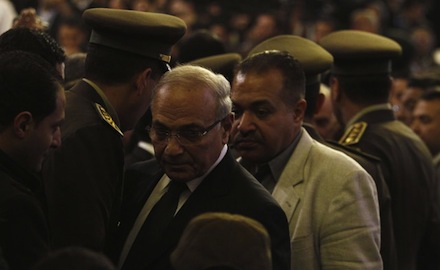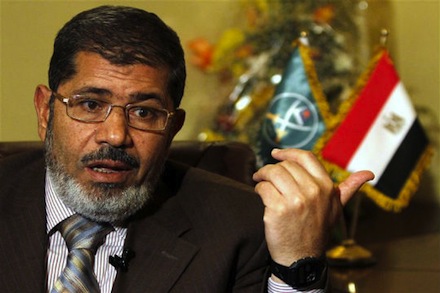 The long-awaited votes from Cairo appear to have been counted and the tally is as follows:
The long-awaited votes from Cairo appear to have been counted and the tally is as follows:![]()
- Hamdeen Sabahi, leftist neo-Nasserist — 993,464 (34.6%)
- Ahmed Shafiq, former Mubarak official — 744,138 (25.9%)
- Mohammed Morsi, Muslim Brotherhood candidate — 579,715 (20.1%)
- Abdel Moneim Aboul Fotouh, alternative moderate Islamist candidate — 553,200 (19.2%)
If true, it means that the heart of Egypt’s revolution turned to Sabahi as its candidate, indicating that they were too uncomfortable with the Islamist roots of Aboul Fotouh, despite his call for moderation, and also with the ‘felool’ background of Amr Moussa, the former secretary-general of the Arab League and decade-long foreign minister for Hosni Mubarak.
Official results have not yet been announced, but as Friday closes in Egypt, it appeared all but certain that Morsi would finish in first place nationally, followed by Shafiq in second, with Sabahi following very closely behind in third place and Aboul Fotouh not incredibly far behind in fourth.
As Egypt now starts to turn toward the Morsi-Shafiq runoff, it is a bit staggering to see that the leading candidate among the voters of Egypt’s largest city will not have a place in the second round. As such, it will be interesting to see what indications Sabahi himself gives for the second round — it’s difficult imagining Sabahi endorsing Shafiq, but it’s just quite possible to see him uniting with Morsi for a wide anti-regime front in the runoff. Note that Sabahi could also urge his supporters to abstain from the runoff — if they did so in large measure, it would vastly reduce the legitimacy of whichever candidate wins on June 17.
Sabahi was the only one of the five major candidates to be neither ‘felool’ associated with the Mubarak regime nor an Islamist, and he caught a wave of popular support at the very end of the campaign — you wonder what he might have done if he had a few more days to capitalize on that momentum.
He was, by and far, the most anti-Israel (and anti-US) of the five candidates as well — expect to hear some more deep-throated Israel-bashing from both Morsi and Shariq over the next month as they vie for his supporters, too.
Ultimately, I think Sabahi captured, with what I’ve called a ‘neo-Nasserite’ approach, a sense of all the pride lost in the past 40 years in Egypt — despite Gamal Abdel Nasser’s failure to build a long-lasting Arab union, Nasser’s victory in the Suez crisis showdown and his nationalist approach in newly-independent Egypt emboldened the Arab world and emboldened Egyptians to believe in a brighter future. In the Nasser era, there was no disputing Egypt was at the heart of the Arab world — militarily, economically, culturally and intellectually. Today, Egypt is the sick man of the Middle East — under the sclerotic regimes of Anwar Sadat in the 1970s and of Mubarak from the 1980s until last year, Egypt suffered a stalemate in the 1973 October War and has been stuck in a detente with Israel ever since — supported by Egypt’s military, but not by its populace and not exactly by its Arab neighbors. Egypt has watched as the economic center of the Arab world slipped away from Cairo, first to Beirut, and then to the Emirates and in the oil wealth of the Saudi kingdom: Riyadh and Dubai are now more important financial centers than Cairo. Intellectually, the Emirates and Qatar are leading the way to build educational institutions in the Middle East, not Egypt. Furthermore, the days when Egyptian film and music dominated Arab culture — the days of Oum Kalthoum and Abdel Halim Hafez — are long gone.
Whoever wins the runoff is going to have to tap into exactly that sense of wounded pride — but also show a vision for how to recover that pride.
The tragedy of the anticipated runoff is that it includes the two candidates least likely to have the political skills or the ideological breadth to accomplish that.



